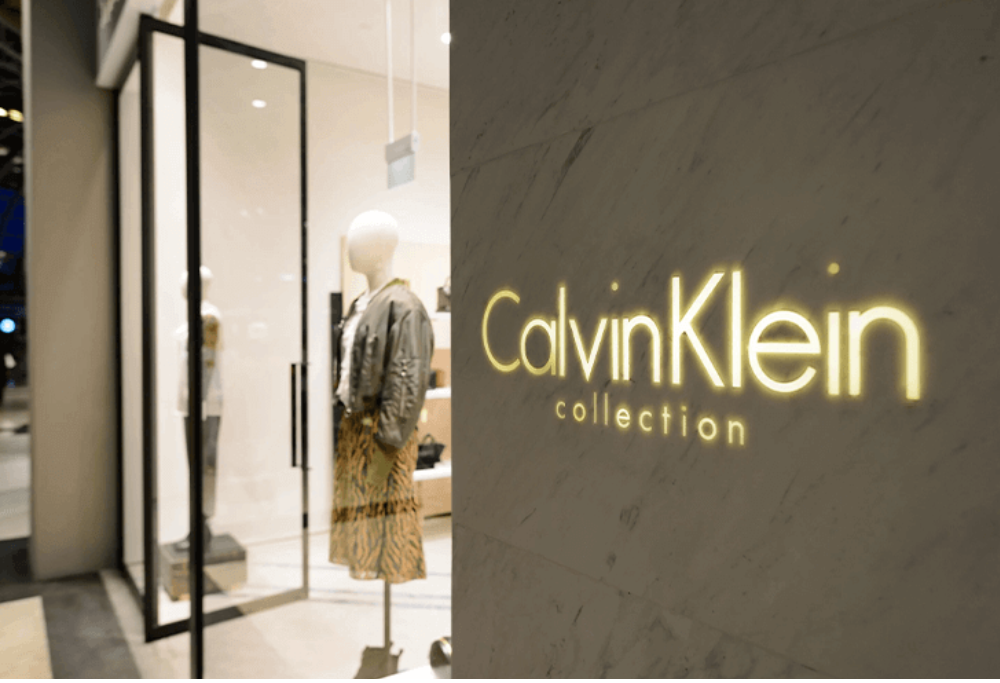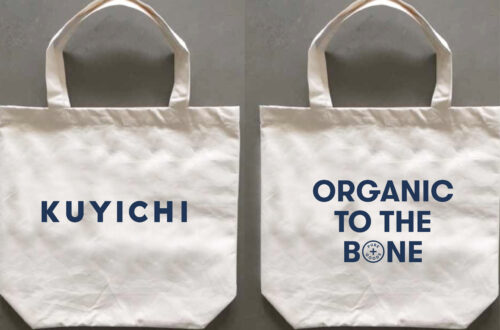Calvin Klein, a subsidiary of the renowned Italian fashion house Giorgio Armani, epitomizes the convergence of luxury and contemporary fashion. Established in 1991, the brand swiftly gained prominence for its accessible yet stylish offerings, catering to a diverse clientele seeking high-quality designs at more attainable price points. With its sleek silhouettes, bold patterns, and innovative fabrications, Calvin Klein has carved a niche in the fashion industry, setting itself apart as a purveyor of urban sophistication. From tailored suiting to casual essentials, the brand’s diverse range of apparel, accessories, and lifestyle products embodies a modern sensibility that resonates with fashion-forward consumers worldwide. Central to its ethos is a commitment to quality, innovation, and accessibility, ensuring that luxury fashion remains within reach for a broader audience.
Calvin Klein‘s success lies in its ability to blend timeless elegance with contemporary trends, creating a distinct aesthetic that speaks to the fashion-conscious individual. With a global presence and a reputation for quality craftsmanship, the brand continues to redefine modern luxury, inspiring individuals to express their unique style with confidence and sophistication. As it evolves and adapts to changing consumer preferences, Calvin Klein remains at the forefront of the fashion landscape, reshaping the way we perceive and engage with luxury fashion in the digital age.
History and Origins
Calvin Klein was founded in 1991 by Giorgio Armani as a youthful, more affordable counterpart to his high-end label. Inspired by street-chic aesthetics and urban culture, the brand quickly gained popularity for its trendy designs and accessible price points. Over the years, Calvin Klein has evolved into a global fashion powerhouse, with a presence in major cities around the world.
Design Aesthetic
At the heart of Calvin Klein‘s appeal is its distinctive design aesthetic, which seamlessly blends luxury craftsmanship with contemporary streetwear influences. The brand’s collections feature sleek silhouettes, bold patterns, and innovative fabrications, reflecting a modern sensibility that resonates with fashion-forward consumers. From tailored suiting to casual essentials, Calvin Klein offers versatile pieces that exude effortless elegance and understated glamour.
Key Product Offerings
Calvin Klein caters to a diverse clientele with a curated selection of apparel, accessories, and lifestyle products. The brand’s clothing range includes everything from chic outerwear and sophisticated dresses to laid-back denim and athleisure-inspired activewear. Complementing its fashion offerings, Calvin Klein also offers a range of accessories, including statement handbags, sleek footwear, and stylish eyewear, allowing customers to complete their looks with ease.
Brand Philosophy
Central to Calvin Klein‘s brand philosophy is a commitment to quality, innovation, and accessibility. The brand prides itself on delivering luxury fashion experiences that are attainable for a broader audience, making high-end style more inclusive and approachable. With a focus on timeless design and contemporary trends, Calvin Klein continues to redefine modern luxury for the fashion-conscious consumer.
Global Presence and Impact
Calvin Klein has a significant global presence, with flagship stores in major fashion capitals such as New York, Milan, and Tokyo. The brand’s influence extends beyond the realm of fashion, with collaborations with artists, musicians, and influencers that further enhance its cultural relevance. Through its innovative marketing campaigns and strategic brand partnerships, Calvin Klein continues to shape the landscape of contemporary fashion.
What is Calvin Klein, and when was it founded?
Calvin Klein is a globally recognized American fashion house founded in 1968 by designer Calvin Klein and his childhood friend, Barry Schwartz. Initially specializing in coats and suits, the brand quickly expanded into other categories, including sportswear, denim, underwear, fragrances, and home goods. Calvin Klein gained notoriety in the 1980s and 1990s for its provocative advertising campaigns, often featuring celebrities and supermodels, which helped to solidify its place in popular culture. Today, Calvin Klein is a multifaceted brand known for its minimalist aesthetic, iconic logo, and diverse range of products.
What kind of fashion does Calvin Klein offer?
Calvin Klein caters to a wide range of tastes and styles, offering both men’s and women’s collections that encompass everything from casual wear and denim to underwear, swimwear, and more formal attire. The brand’s signature aesthetic is rooted in minimalism, often featuring clean lines, simple silhouettes, and a muted color palette. However, they also embrace bolder elements like graphic prints, unexpected textures, and playful patterns, ensuring there’s something for everyone. Whether you’re looking for a classic white t-shirt, a comfortable pair of jeans, stylish underwear, or a chic evening dress, Calvin Klein offers a diverse selection of options.
Who is the target audience for Calvin Klein?
Calvin Klein’s target audience is quite broad, encompassing men and women of various ages and lifestyles. They appeal to those who appreciate minimalist and modern aesthetics, high-quality materials, and a touch of sensuality in their style. While their core demographic often includes younger, fashion-conscious individuals, their versatile offerings also attract more mature consumers who value comfort and classic design. Calvin Klein’s marketing campaigns often feature celebrities and influencers, further solidifying their connection with a broad and diverse audience.
What are the key characteristics of Calvin Klein’s design aesthetic?
Calvin Klein’s design aesthetic is characterized by several key elements:
- Minimalism: Clean lines, simple silhouettes, and a focus on uncluttered designs are hallmarks of the brand. This creates a timeless and sophisticated look that transcends trends.
- Modern Sensibility: While rooted in minimalism, Calvin Klein often incorporates contemporary elements like unexpected textures, innovative fabrics, and playful pops of color.
- Bold Branding: The iconic “CK” logo is a prominent feature of many Calvin Klein products, serving as a symbol of status and recognition.
- Provocative Edge: Calvin Klein has a history of pushing boundaries with its advertising campaigns, often incorporating a hint of sensuality and provocation into its brand image.
How does Calvin Klein differentiate itself from other fashion brands?
Calvin Klein distinguishes itself from other fashion brands through several key factors:
- Iconic Branding: The “CK” logo is instantly recognizable and synonymous with modern, minimalist style.
- Provocative Marketing: The brand’s history of bold and sometimes controversial advertising campaigns has cemented its place in popular culture and garnered significant attention.
- Diverse Product Range: Calvin Klein offers a wide variety of products, from apparel and accessories to fragrances and home goods, catering to diverse consumer needs and preferences.
- Accessible Luxury: While maintaining a high standard of quality, Calvin Klein’s products are generally more accessible than those of high-end luxury brands, making them appealing to a wider audience.
What are some of the popular products offered by Calvin Klein?
Calvin Klein boasts a wide range of popular products across various categories:
- Apparel: Jeans (various cuts and washes), t-shirts (graphic tees, logo tees, basics), underwear (boxer briefs, briefs, bras), swimwear, dresses, suits, sweaters, and outerwear (coats, jackets).
- Accessories: Watches, sunglasses, jewelry (necklaces, earrings, bracelets, rings), bags (totes, backpacks, crossbody bags), belts (leather, woven, logo), and footwear (sneakers, boots, heels, sandals).
- Fragrances: Iconic scents like CK One, Obsession, and Euphoria are beloved by consumers worldwide.
- Home Goods: Bedding, towels, bath products, and other home accessories.
How does Calvin Klein maintain its commitment to quality while offering relatively accessible prices?
Calvin Klein balances quality and affordability through a multi-faceted approach:
- Materials: While they may not always use the most expensive materials, they prioritize quality fabrics and construction to ensure durability and a premium feel.
- Production: They leverage economies of scale and partner with efficient manufacturers to optimize production costs.
- Design: By focusing on versatile and timeless designs, they can produce larger volumes, which helps lower costs per unit.
- Licensing: Calvin Klein licenses its brand name for various product categories, expanding its reach and generating revenue while maintaining control over quality standards.
What is the significance of Calvin Klein’s global presence?
Calvin Klein’s global presence is crucial for its success. With stores and online platforms in numerous countries, the brand reaches a vast audience and adapts its marketing strategies to cater to different cultures and preferences. This global reach enhances brand recognition, fosters a sense of community among consumers worldwide, and contributes significantly to its financial success.
How has Calvin Klein adapted to the digital age and changing consumer preferences?
Calvin Klein has adapted to the digital age by investing heavily in e-commerce, establishing a strong online presence, and leveraging social media for marketing and customer engagement. They’ve also responded to changing consumer preferences by incorporating sustainable materials, promoting inclusivity in their marketing campaigns, and offering gender-neutral designs.
What is the brand’s overall impact on the fashion industry?
Calvin Klein has had a profound impact on the fashion industry:
- Minimalism: They popularized minimalist aesthetics and clean lines, influencing countless designers and brands.
- Provocative Marketing: Their bold and often controversial advertising campaigns pushed boundaries and redefined fashion marketing.
- Brand Licensing: They pioneered brand licensing, expanding their reach and making their products more accessible to consumers worldwide.
- Cultural Impact: Their campaigns and designs have often reflected and influenced cultural shifts and trends, making them a significant cultural force.
What is the future outlook for Calvin Klein?
The future of Calvin Klein shines brightly, fueled by a legacy of innovation, adaptability, and a deep understanding of consumer desires. Building upon its strong global presence, the brand is poised for continued expansion, reaching new markets and demographics while solidifying its position as a global leader in accessible luxury fashion. This growth will likely be driven by several key factors. First, Calvin Klein is expected to double down on its digital transformation, leveraging e-commerce, social media, and emerging technologies to provide seamless and personalized shopping experiences. Second, sustainability and ethical production are becoming increasingly important to consumers, and Calvin Klein is well-positioned to lead the charge, integrating eco-friendly materials and responsible practices into its collections. Third, the brand’s commitment to inclusivity and diversity will continue to be a cornerstone of its identity, resonating with a broader audience and fostering a sense of belonging.






